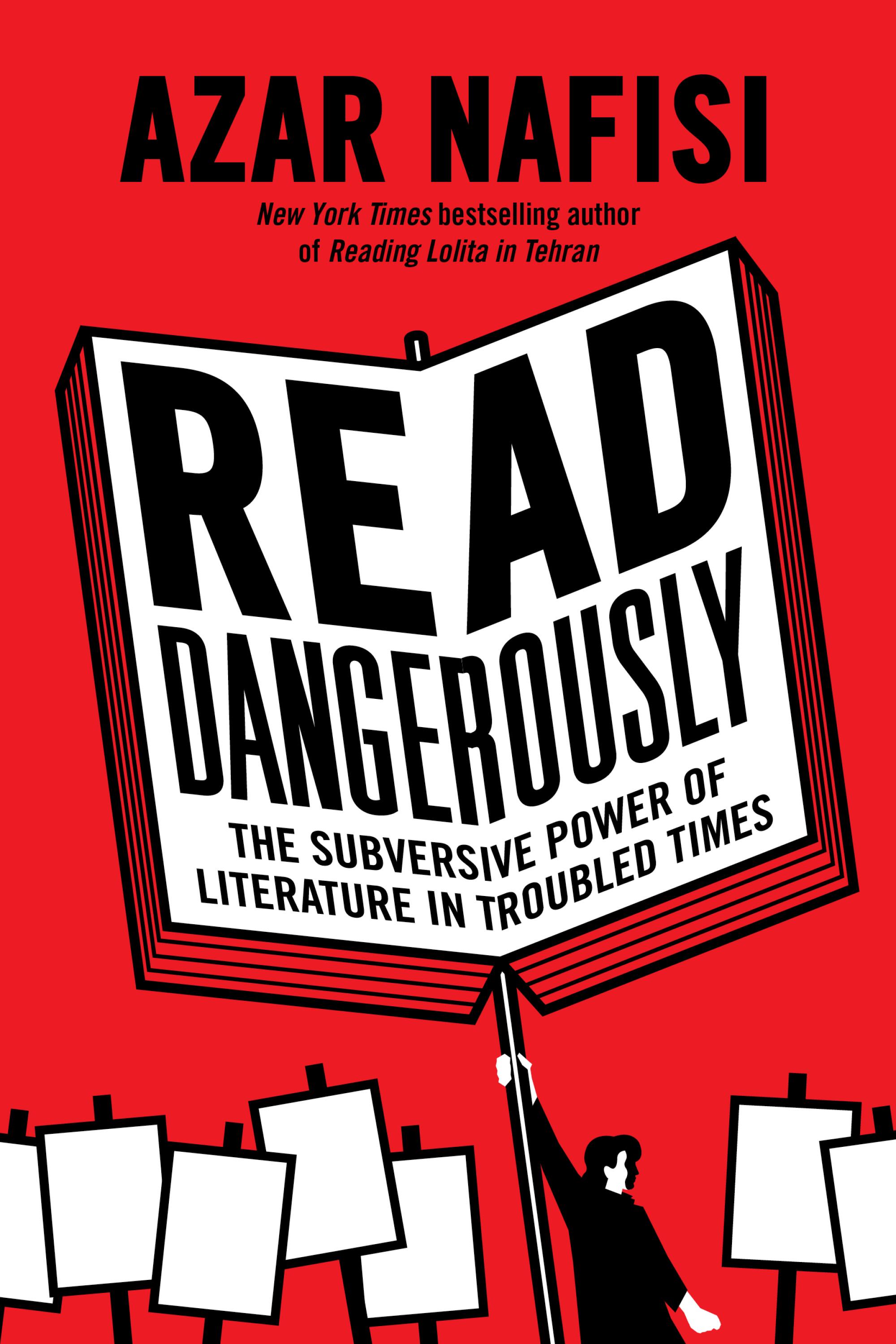
On the Shelf
Read Dangerously: The Subversive Power of Literature in Troubled Times
By Azar Nafisi
Dey Street: 240 pages, $27
If you buy books linked on our site, The Times may earn a commission from Bookshop.org, whose fees support independent bookstores.
Azar Nafisi is angry, sad and frustrated by what she sees going on in the world. When she feels that way, she picks up a book — not to escape, but to engage. Nafisi, author of the bestselling “Reading Lolita in Tehran” and other books about the power of literature, argues passionately that reading and writing can be a tool — no, a weapon — in troubled times.
“I wanted to take on the differences between the totalitarian and democratic mind-sets,” Nafisi, 73, says of her latest book, “Read Dangerously,” which explores writers as diverse as Plato, Ray Bradbury and Salman Rushdie … and that’s just the first chapter. Later sections delve into Toni Morrison, Margaret Atwood, Elliot Ackerman, Daniel Grossman and one of Nafisi’s favorites, James Baldwin.
Nafisi says Vladimir Putin, whom she describes as driven by fear, is just the latest bully to try to overwhelm the truth with propaganda and censorship. She has seen totalitarian demagoguery firsthand while living in Iran, but what incited her latest work was the inherent dishonesty of the Trump administration.
The book, structured as letters to her late father about her reading, also examines Nafisi’s family history: Her mother was among the first women elected to the parliament in Iran; her father was mayor of Tehran before becoming a political prisoner for four years. Nafisi later studied in America and served as a professor in Tehran but was forced to leave in the 1990s for refusing to wear a veil. (She also pushed the boundaries of what could be taught in her classes.)
Empowering the country’s dissidents, not military action, is the best way to weaken the Islamic regime.
Even outside the classroom, Nafisi believes in examining books for their deepest truths. “I instinctively underline and take notes even when I’m reading a mystery,” she says, speaking on video in front of a wall of books.
For her fifth book, the author sought as wide a range of work as possible, the better to arm herself with her weapons of choice. “It took me a long time and a lot of reading,” she says, adding that this “work” was also quite pleasurable. “I want a medley of books to find responses on different levels.”
Some books that she loved, like Mario Vargas Llosa’s “The Feast of the Goat,” didn’t fit right thematically. “The book will tell you if you’re not doing the right thing,” she says. Nafisi’s interview with The Times has been edited for length and clarity.

Why did you structure the book as letters to your late father?
I knew I didn’t want this to just be essays. I wanted it to be more intimate and yet not too personal, so I knew I wanted to write letters. The idea started with me feeling frustrated — I didn’t know how to vent my anger, so I was writing letters in my diaries to everyone, including Trump. I was writing to this son-of-a-gun all the time. But for the book that was not working, so I started writing letters to the authors I had chosen. That felt very artificial — I was telling them about their own stories. A friend asked why I didn’t write to some other person and then there wasn’t much hesitation. My father and I had such a long history writing to each other.
You quote Zora Neale Hurston: “No I do not weep at the world — I am too busy sharpening my oyster knife.” Is this book you sharpening your blade in order not to weep?
Every time I write I am sharpening my oyster knife. Writing and reading are my only weapons. These actions don’t offer you comfort, they make you question yourself. Reading and writing are there to reveal the truth.
The whole point for me as a writer is that I write in order to see. Unlike the totalitarian mind-set that knows everything already, that has defined you before meeting you, when you go into writing, you go into investigation.
But you worry that in America, as in Bradbury’s “Fahrenheit 451,” the public will just simply stop reading and caring, that we are too blasé.
In this country we more and more neglect imagination and ideas, especially in our education system. There’s a quotation from Saul Bellow that asks, in effect, how those who survived the ordeal of the Holocaust will survive the ordeal of freedom. In a democracy, we are threatened by our sleeping consciousness, this atrophy of feeling. When I returned to America [in 1997], I saw that people didn’t understand freedom is something to fight for every single day. We want to be comfortable; we want to avoid pain. That’s why Bradbury came to mind for this book.

You say fiction seeks truth and lies create a false reality. But in countering Trump’s lies or fighting Putin’s propaganda about his invasion of the Ukraine, how do we get people to know the difference?
There are people with totalitarian mind-sets whose first job is to obscure, distort and destroy the truth. I asked this about Rushdie. What is it about a man with a pen as his only weapon who is so dangerous that he must be eliminated?
It is out of fear that they become so vicious and brutal. We are dealing with weak people who cannot tolerate anyone other than themselves. Baldwin used to say ignorance allied with power is the most pernicious enemy of justice. So just by the act of writing and reading you are putting up an act of resistance. This is not just about policies here and there; it’s trying to find a way to resist.
It is a long process, but if writing had no effect, then why are totalitarians always so scared? Sometimes you lose the battle, but what other way do we have, apart from becoming like them?
So it’s about winning hearts and minds, one at a time?
I saw it with my own eyes with my own students. I was always amazed at how some of my most devoted Islamist students, who were in a position of power, were taken by “Huckleberry Finn.” What was it in the mind of this young Iranian that would connect to this mischievous satirist, Mark Twain? It is that shock of recognition. We celebrate differences, and we should, but differences cannot be celebrated without empathy, without celebrating our common humanity.
Good fiction by its structure is democratic. Bad fiction is usually the one where the writer imposes her voice on all the characters. Good fiction gives voice to even the villains. That is very magnanimous and generous. I believe generosity does have a role in standing up to totalitarian mind-sets.
Nafisi will be in conversation with PBS NewsHour senior correspondent Jeffrey Brown in a virtual event sponsored by the Library Foundation of Los Angeles at 7 p.m. March 8 .
More to Read
Sign up for our Book Club newsletter
Get the latest news, events and more from the Los Angeles Times Book Club, and help us get L.A. reading and talking.
You may occasionally receive promotional content from the Los Angeles Times.







